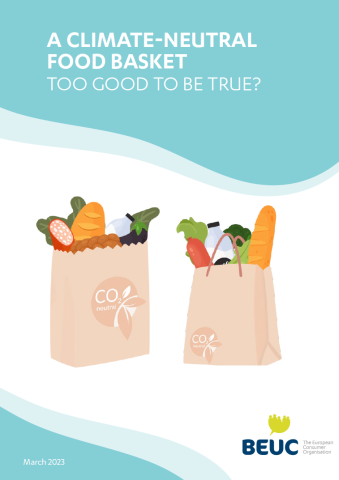Climate-neutral claims on food must be banned, shows consumer groups report
About this publication
Misleading ‘carbon neutral’ claims are rife in the food sector and confuse consumers, as shown in a snapshot of examples published today by consumer groups from ten countries.1 BEUC is calling on the EU to ban the use of carbon neutral claims for all products including food and drink, while both the European Commission and Parliament are due to tackle greenwashing in the coming weeks.2
‘Carbon neutral’, ‘CO2 neutral’, ‘carbon positive’, ‘carbon neutral certified’ and the likes are now a common sight on supermarket shelves as shown in our snapshot. Examples range from processed pork products to bananas transported half-way across the world.
Current rules only allow authorities or courts to intervene once the damage is done and consumers have already been misled. Consumers should in the first place not be exposed to such deceptive practices. BEUC is calling for an outright ban of carbon-neutral claims because:
-
They are scientifically inaccurate: the production of all food and drinks will always necessitate the emission of carbon.
-
Carbon offsetting, which underpins most such claims, provides no guarantees for ‘locking in’ carbon for the future.
-
These claims mislead consumers, giving the false impression that the products are a good choice for the climate.
-
Handling of complaints by national authorities is so slow that the harm of climate greenwashing is already done.
-
Such claims can deter consumers from changing their diet (e.g. eating more plant-based food), which could be far more beneficial for the climate overall.
Monique Goyens, Director General of BEUC, commented:
“There is no such thing as a ‘CO2 neutral’ banana or plastic water bottle. Carbon neutral claims are greenwashing, pure and simple. It’s a smoke screen giving the impression companies are taking serious immediate action on their climate impact. The truth is they are delaying action for many years by “compensating” their carbon emissions instead. Planting trees which will take decades to grow is far easier and cheaper, yet significantly less effective, than cutting emissions from their current climate-harmful activities.
“Green marketing messages such as ‘carbon neutral’, ‘CO2 neutral’, or ‘carbon positive’ are doing more harm than good. For climate-damaging meat or dairy products, such positive-sounding claims are bound to encourage a status quo in consumption habits. This is utterly counterproductive at a time of climate emergency, when consumers are hungry for reliable and meaningful information to help them adopt more environmentally friendly diets. The EU must seize the legislative opportunities in the coming weeks to weed out carbon-neutral claims from the market.”
Background:
- Carbon offsetting is the practice which lies behind many food companies’ carbon neutrality claims. It allows businesses to pay, often cheaply, for carbon credits from offsetting projects to ‘balance’ out their own carbon-emitting activities in order to claim ‘carbon neutrality’. Each credit represents one ton of carbon emissions compensated.
These carbon compensation schemes often rely on tree-planting projects in developing countries to generate such credits. However, while the effects of carbon emissions from companies buying credits are certain and long-term, the compensatory effects of nature-based offsetting projects are anything but guaranteed.
-
A 2019 BEUC survey showed that 3 in 4 consumers are willing to change their eating habits for the environment, yet struggle to turn intention into deeds, partly because of the challenge of identifying the sustainable options in the shop.
Full report available here.
1 There are 11 consumer groups involved, from 10 countries: Austria (Arbeiterkammer), Belgium (Testachats/ Testaankoop), Denmark (Forbrugerrådet Tænk), France (CLCV, UFC-Que Choisir), Germany (vzbv), Netherlands (Consumentenbond), Portugal (DECO), Spain (OCU), Sweden (Sveriges Konsumenter), and Switzerland (FRC).
2 On 22 March 2023, the European Commission is due to publish a proposal for the Green Claims Initiative. The following week, the European Parliament’s Internal Market and Consumer protection (IMCO) committee will vote on the “Empowering the consumer for the green transition” proposal.
Download:


